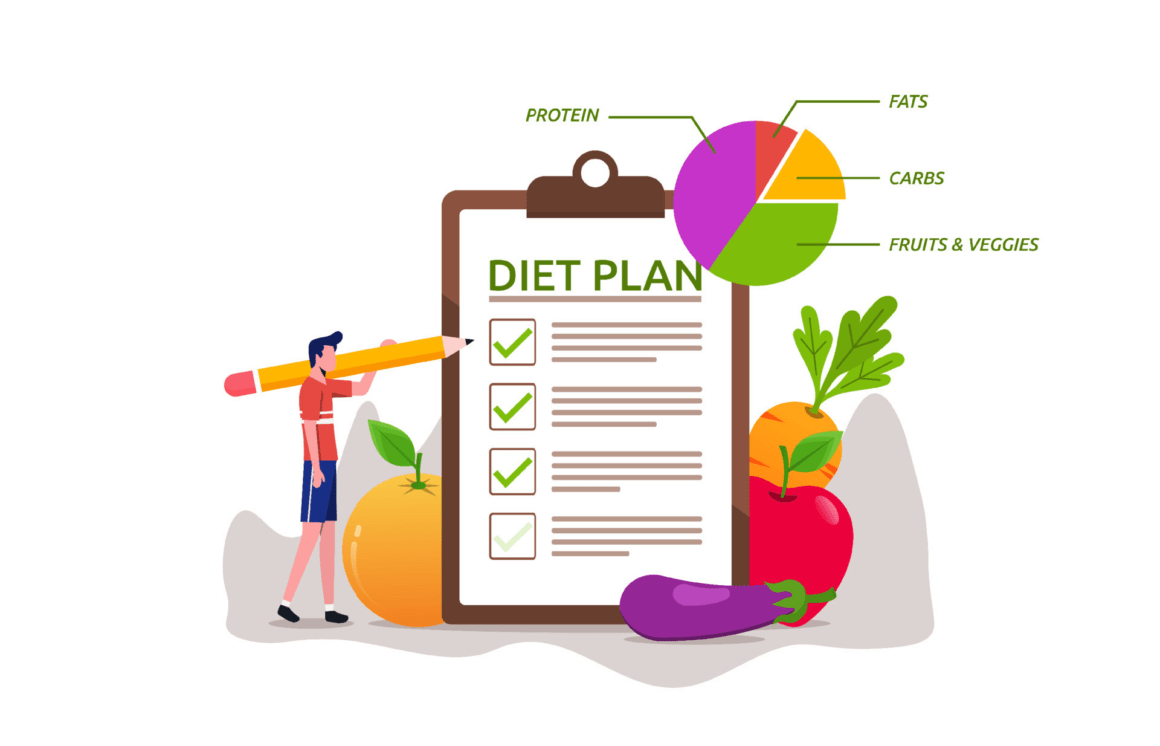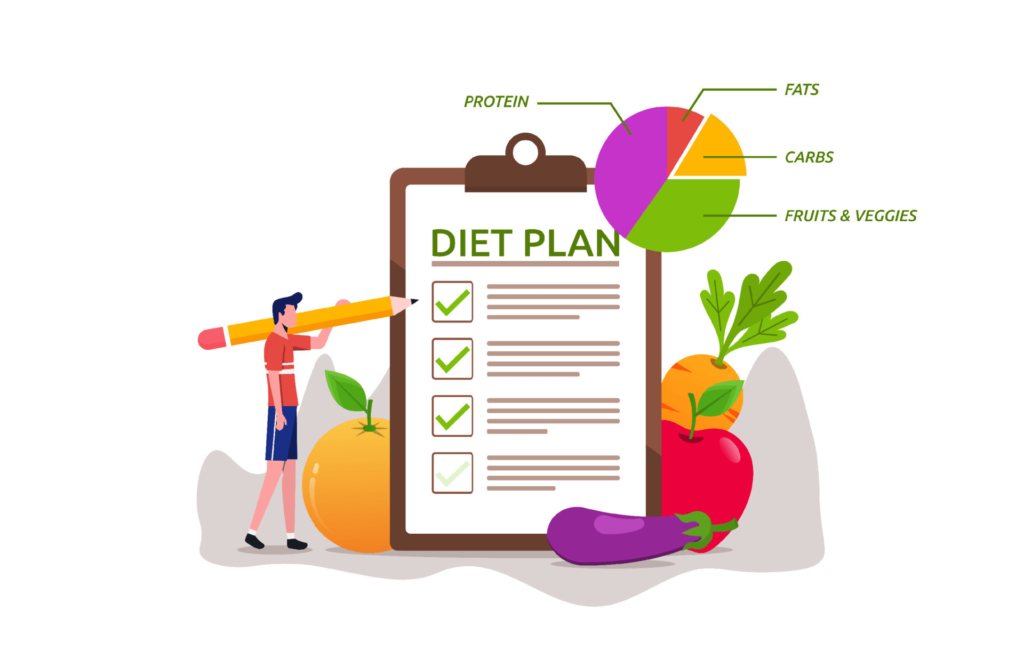
In today’s fast-paced world, nutrition plays a crucial role in maintaining overall health and well-being. A balanced diet not only supports physical health but also enhances mental clarity, boosts energy levels, and reduces the risk of chronic diseases. This comprehensive guide explores the fundamentals of nutrition, strategies for creating personalized diet plans, specialized diet options, meal preparation tips, and practical advice for incorporating healthy eating habits into your daily routine.
Understanding Nutrition Fundamentals
Macronutrients: The Building Blocks of a Healthy Diet
Macronutrients are essential nutrients that provide energy and support various bodily functions. They include carbohydrates, proteins, and fats, each playing a distinct role in maintaining overall health:
- Carbohydrates: Found in foods such as grains, fruits, vegetables, and legumes, carbohydrates are the body’s primary source of energy. Opt for complex carbohydrates like whole grains and fiber-rich foods to promote sustained energy levels and support digestive health.
- Proteins: Proteins are crucial for muscle repair, immune function, and hormone production. Incorporate lean sources of protein such as poultry, fish, beans, lentils, tofu, and dairy products into your diet to support muscle growth and overall health.
- Fats: Healthy fats, including monounsaturated and polyunsaturated fats found in olive oil, nuts, seeds, and fatty fish, are essential for brain function, hormone balance, and nutrient absorption. Limit saturated fats and trans fats found in processed foods and fried items to promote heart health and reduce inflammation.
Micronutrients: Essential Vitamins and Minerals
Micronutrients, such as vitamins and minerals, are essential for maintaining immune function, supporting metabolism, and promoting overall health. Ensure adequate intake of:
- Vitamins: Include a variety of fruits, vegetables, and fortified foods in your diet to obtain essential vitamins such as vitamin A, vitamin C, vitamin D, and vitamin E.
- Minerals: Consume foods rich in minerals like calcium, magnesium, potassium, and iron to support bone health, muscle function, and electrolyte balance.
Hydration: Importance of Water Intake
Proper hydration is critical for maintaining cellular function, regulating body temperature, and supporting digestion and nutrient absorption. Aim to drink at least 8-10 glasses of water daily, and increase fluid intake during physical activity or in hot weather conditions to prevent dehydration.
Creating Personalized Diet Plans
Assessing Nutritional Needs and Goals
Before creating a diet plan, assess your nutritional needs, dietary preferences, and health goals. Consider factors such as age, gender, activity level, and any specific dietary restrictions or medical conditions that may influence your nutritional requirements.
Establishing Balanced Meals
Design balanced meals that incorporate a variety of nutrient-dense foods from all food groups:
- Fruits and Vegetables: Aim for a colorful variety of fruits and vegetables to obtain vitamins, minerals, antioxidants, and dietary fiber.
- Whole Grains: Choose whole grains like brown rice, quinoa, oats, and whole wheat bread to provide complex carbohydrates and fiber for sustained energy and digestive health.
- Lean Proteins: Include lean sources of protein such as poultry, fish, beans, lentils, and tofu to support muscle repair and growth.
- Healthy Fats: Incorporate sources of healthy fats like avocados, nuts, seeds, and olive oil to promote heart health and enhance nutrient absorption.
Portion Control and Moderation
Practice portion control and moderation to maintain a balanced diet and manage caloric intake. Use smaller plates, measure serving sizes, and be mindful of portion sizes to prevent overeating and support weight management goals.
Meal Planning and Preparation
Plan meals in advance to save time, reduce food waste, and ensure balanced nutrition throughout the week:
- Create a Weekly Meal Plan: Outline breakfast, lunch, dinner, and snacks for each day, incorporating a variety of flavors and textures to keep meals exciting and satisfying.
- Prep Ingredients Ahead: Wash, chop, and portion fruits, vegetables, and proteins in advance to streamline meal preparation and facilitate quick and convenient cooking during busy weekdays.
Smart Shopping and Label Reading
Make informed food choices by reading nutrition labels and selecting foods that align with your dietary goals and preferences:
- Choose Whole Foods: Opt for minimally processed foods and ingredients to minimize added sugars, sodium, and artificial additives.
- Check Nutrition Labels: Review serving sizes, calories, nutrient content, and ingredient lists to make informed decisions about food purchases and prioritize nutrient-dense options.
Specialized Diet Plans and Considerations
Mediterranean Diet
The Mediterranean diet emphasizes whole grains, fresh fruits and vegetables, lean proteins, and healthy fats like olive oil and nuts. It is rich in antioxidants and omega-3 fatty acids, promoting heart health, cognitive function, and longevity.
Plant-Based Diet
A plant-based diet focuses on consuming primarily fruits, vegetables, legumes, nuts, seeds, and whole grains while minimizing or eliminating animal products. It supports overall health, reduces the risk of chronic diseases, and promotes environmental sustainability.
Ketogenic Diet
The ketogenic diet is a low-carbohydrate, high-fat diet that induces ketosis, a metabolic state where the body uses fat for fuel instead of carbohydrates. It may aid in weight loss, improve blood sugar control, and enhance mental clarity and energy levels.
Gluten-Free Diet
A gluten-free diet excludes gluten-containing grains like wheat, barley, and rye, making it suitable for individuals with celiac disease or gluten intolerance. Focus on naturally gluten-free foods and gluten-free alternatives to maintain balanced nutrition and avoid nutrient deficiencies.
Low-FODMAP Diet
The low-FODMAP diet restricts foods high in fermentable carbohydrates (FODMAPs), which can trigger digestive symptoms in individuals with irritable bowel syndrome (IBS). Work with a registered dietitian to identify and manage trigger foods while ensuring adequate nutrient intake.
Integrating Nutrition with Lifestyle Factors
Physical Activity and Exercise
Combine balanced nutrition with regular physical activity and exercise to enhance overall health, support weight management, and improve fitness levels. Engage in a combination of cardiovascular exercises, strength training, and flexibility exercises to achieve optimal fitness and well-being.
Sleep and Stress Management
Prioritize adequate sleep and practice stress management techniques such as mindfulness meditation, deep breathing exercises, or yoga to support overall health, mental clarity, and emotional well-being. Aim for 7-9 hours of quality sleep each night to promote optimal recovery, hormone balance, and cognitive function.
Hygiene and Food Safety
Practice proper hygiene and food safety measures to prevent foodborne illness and ensure the safety of your meals:
- Cleanliness: Wash hands thoroughly before handling food, and sanitize kitchen surfaces, utensils, and cutting boards regularly.
- Food Storage: Store perishable foods in the refrigerator or freezer promptly to maintain freshness and prevent spoilage.
- Cooking Temperatures: Cook foods to recommended internal temperatures to eliminate harmful bacteria and ensure food safety.
Maintaining Long-Term Dietary Success
Monitor Progress and Adjustments
Monitor your dietary habits, track progress towards your goals, and make adjustments as needed to optimize nutrition, support health objectives, and maintain long-term dietary success. Celebrate achievements, reflect on challenges, and continue to refine your diet plan to align with evolving lifestyle preferences and health priorities.
Seek Professional Guidance
Consult with a registered dietitian, nutritionist, or healthcare provider for personalized guidance, nutrition counseling, and evidence-based recommendations tailored to your individual needs, goals, and dietary preferences. Work collaboratively to develop a sustainable diet plan that promotes optimal health, supports dietary adherence, and enhances overall well-being.
Conclusion
Nutrition and diet plans are fundamental pillars of health and well-being, influencing energy levels, disease prevention, and overall quality of life. By understanding nutrition basics, creating personalized diet plans, incorporating balanced meals, and integrating healthy eating habits into your lifestyle, individuals can cultivate sustainable dietary practices, achieve nutritional goals, and enjoy the benefits of a healthy and fulfilling life. Embrace the journey towards optimal health through informed food choices, mindful eating practices, and a commitment to lifelong wellness.
This comprehensive guide provides actionable insights, practical strategies, and valuable tips to empower individuals in mastering nutrition and diet plans. Whether you’re embarking on a new dietary regimen, seeking to optimize your current eating habits, or exploring specialized diet plans, these guidelines will support your journey towards achieving health, vitality, and well-being through balanced nutrition and mindful eating practices.





